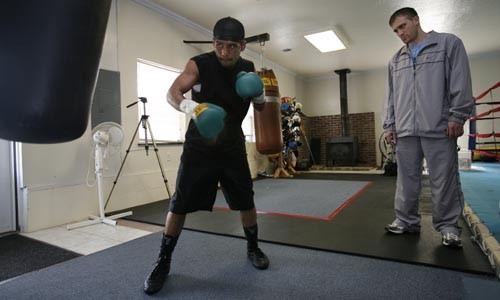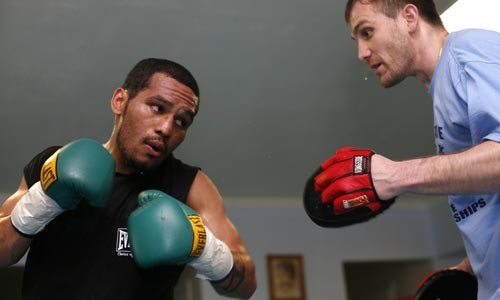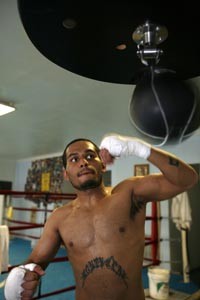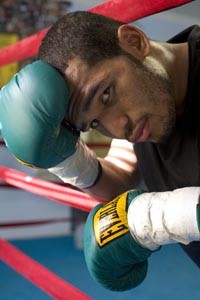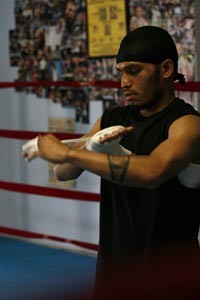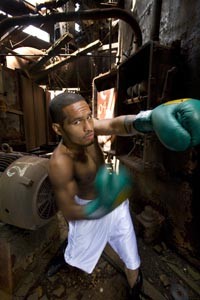It smells like someone is cooking a putrid stew out of Billy Conn's old sweat socks.
The smell assails you on the threshold of the World Class Boxing gym, which you reach by climbing flights of stairs leading up from a side street in Ambridge. Before you've caught your breath, your sinuses are assaulted by the pungent odor of old, dried blood and old, dried sweat. And something else that likely leaks or oozes from the heavy bag every time a boxer hammers away at it: the blood, sweat and puke of success.
It's the scent of determination; the stench of hard work. It's the smell of victory -- and the diminutive but very powerful boxer jabbing at imaginary opponents in the mirror is breathing it deeply, trying to make himself one of the best featherweight boxers in the world.
Monty Meza-Clay inhales that smell every time he hits the floor for a push-up. He gives it off every time he hits a heavy bag with a quick-stinging combo. It's in the air every time he pressures and punishes a sparring partner on the gym's blood-stained, white-canvas boxing ring, surrounded by hundreds of posters, old weights -- even a sledge hammer leaning against the wall.
Right now, though, Meza-Clay is dancing around the blue mat -- part ballroom dancer, part lethal weapon. Slow-slow-quick-quick-slow. Jab-Jab-cross-cross-jab.
Meza-Clay, a 27-year-old who grew up in Rankin and still lives nearby in Baldwin, is a study in perpetual motion. Even when he's talking, he's moving: dancing, boxing, occasionally stopping to check out his chiseled pectorals in the mirror. And almost always smiling.
Because for Meza-Clay, life is all smiles. He was just named the top contender for the world featherweight title, according to the World Boxing Organization. He's also ranked among the 10 best in his weight class by two of boxing's other major associations: The World Boxing Association ranks him ninth, and the International Boxing Federation ranks him as number four.
Thanks to his top ranking from the WBO, Clay is guaranteed a shot at the champion, Steven Luevano of Los Angeles, some time in the next nine months, according to his promoter. That means that Meza-Clay's next fight -- a May 30 internationally televised bout against Omar Lizarraga at the Monroeville Expo Mart -- is a must-win situation.
Meza-Clay knows he is standing on the precipice of greatness, and he doesn't plan on wasting any opportunity. Tommy Yankello, the only trainer this young fighter has ever had as a professional, knows a title shot is coming and he's pretty confident about Meza-Clay's chances. Meza-Clay doesn't doubt himself at all.
"I will be the world champion by the end of the year," he says, during an unaccustomed moment of idleness on a corner stool. That sounds like arrogance, and maybe a bit of it is. When you're only 5'2" and weigh 126 pounds, you've got to be a little cocky to pound your way to a living as a boxer. Then again, he's never once been defeated fighting as a featherweight ... and he came out on top of the toughest bout of his life: a scrum involving a handful of local police officers.
He doesn't expect his fortunes to change any time soon.
"Am I sure?" he asks. "Man, there's not a doubt in my mind."
Growing up in Rankin, a Mon Valley town that's absorbed a few body blows itself since the collapse of the steel industry, Meza-Clay didn't discover boxing. Boxing discovered him.
His father, Ramont Clay Sr., was an amateur fighter in the earlier rounds of his life. He promised young Monty, the middle child in a family with three children, that he would get him started in the sport, but it never seemed to happen.
"Every time we'd drive by a boxing gym, my dad always told me he was going to get me in there to learn to box, but he never ran me past," recalls Meza-Clay. "It ended up being someone he fought with that got me in the gym.
"All I know is it's a good thing I got there, though," he adds. Because if it weren't for boxing, "who knows what I'd be doing?"
It's unlikely he'd be a scholar: As a student in the Woodland Hills district, Meza-Clay describes himself as a class clown, one who heard the crackling high school PA system -- "Ramont Clay come to the office, Ramont Clay, come to the office" -- more often than he heard his teachers.
"Some times, I wouldn't wait" for the loudspeaker, jokes Meza-Clay, who adopted his Mexican mother's maiden name in 2004. "I'd go there first thing and say, 'I know y'all probably want me for something.'"
But in January 1997, the call to the office was a little different. A man who had once boxed as an amateur with Clay's father had tracked him down at the school, and when Monty reported to the office, he asked if Clay was interested in giving the fight game a try. Clay was, and they exchanged numbers. After 16 years, Monty Clay was finally inside the gym his father had driven past.
"I remember my first time in the gym, I'm standing in front of a mirror with all of these guys around, doing what they were telling me to do," Clay recalls. "They start saying, 'Wow, he's a natural, he's a natural.' That was all she wrote. I wasn't in that gym a month before I had my first amateur fight."
One of Clay's early trainers was Jimmy Cvetic, the head of the Police Athletic League and a local guru to amateur boxers. Cvetic says he saw something in Clay from the start.
"He was very charismatic, very open and unassuming, just a really nice kid," says Cvetic. "Too nice to be a boxer."
And in fact, Clay's early career, while successful to a point, was disappointing: He won more than 50 fights as an amateur, but he struggled to make it to the next level -- state Golden Gloves champion.
"I was beating the average fighters pretty easily, but then losing when I'd get in the ring with the better guys," Meza-Clay says. "I didn't know how to get over that hump, and then along came Tommy."
That would be Tommy Yankello, a well-known trainer whose credits include working with Paul Spadafora, the former world boxing champion from McKees Rocks who has spent some time in and out of jail since admitting to shooting his girlfriend in 2003.
Yankello "taught me how to train harder and smarter," Meza-Clay says. He won the state Golden Gloves title in 2000, and by early 2002, he had his eye on an even bigger prize -- a spot on the U.S. Olympic team. He was supposed to fight in Baltimore in early February of that year, the first step on the road to the 2004 games.
But Clay was taken out of contention thanks to a fight one cold January night. The arena was not a boxing ring, but the streets of Rankin. And his opponent was clad not in trunks and boxing gloves, but a police uniform.
When Monty Meza-Clay was approached by police on the night of Jan. 19, 2002, he didn't know why. He had just started his shift driving a jitney, and he didn't know that there had been shots fired at a nearby housing complex.
"I was in the wrong place at the wrong time," he says today.
The officers -- representing Rankin, Edgewood, Braddock and Swissvale -- wanted to know if he knew anything about the shooting. Meza-Clay says he told them he hadn't been in the area and couldn't help. Apparently, they didn't believe him.
After putting Meza-Clay in cuffs and calling him a racial slur, Meza-Clay says, a Rankin officer "grabbed me by the ponytail and slammed my head into the car. Boom! Lifted me up by my hair and slammed me down again. Boom! Boom! Boom!
"I couldn't believe what was going on," Meza-Clay recalls. "It was crazy. They had no reason to approach me. I hadn't ever been in any trouble with the law."
Officers from the other municipalities reportedly stood by and did nothing while the beating took place.
When it was all over, the police, the police left Meza-Clay lying in the snow, beaten. He wasn't even arrested, and no police report was filed in the incident. The only evidence Meza-Clay had were the bruises on his body. And he was pissed.
Monty-Clay's injuries required physical therapy -- his rotator cuff had been injured in the confrontation -- which left him no time to prepare for his Olympic tryouts.
"I truly believe that Monty had a legitimate shot at the Olympics," says Cvetic. "I think that incident really cost him."
His dreams of Olympic gold dashed, Monty Meza-Clay sued the four municipalities in April 2002, seeking compensation for his injuries and accountability from the police officers involved. But within days of filing his lawsuit, Meza-Clay was under investigation by the same police department he was suing.
Three days after the filing, Meza-Clay got a call to pick up two customers in his jitney. But when he arrived, his fare told him to leave, before either man even got into the car. A few days later, he briefly carried an unknown passenger to meet the same two men.
Meza-Clay thought little of the transactions, but shortly afterward, police in Swissvale charged him with selling drugs. One of his customers, it turned out, had been a drug dealer turned informant, who police said had offered to set up the deals. The other was an undercover police officer, who charged Meza-Clay with selling drugs on both occasions.
For a moment, it seemed like the only fights in Monty Meza-Clay's future would be scraps in a prison recreation yard.
"The stuff they put me through, the stuff they did to me ...," Meza Clay says today. "I filed a lawsuit and then three days later, all of a sudden I'm a dope dealer. I think most people knew this wasn't right. But that didn't help me at the time."
The charges slowly made their way through the justice system over the next two years, during which time Meza-Clay says he was "shut down." He lost a couple of retail jobs when the charges showed up on a background check. He tried to enlist in the military, but they wouldn't take an alleged crack-slinger either.
But to many observers, it became increasingly clear that Meza-Clay had been sucker-punched. According to news reports at the time, officers initially denied that there was any surveillance tape of the alleged transactions. But later they conceded that film had been shot of the second encounter; when Clay's attorneys demanded the tapes be produced, they quickly realized they showed no illegal activity. The tape would later become key pieces of evidence at Meza-Clay's drug trial -- for the defense.
In fact, the only witness prosecutors called was the undercover officer. The informant Billy Hawkins testified -- for the defense -- that police pressured him to become an informant after he was stopped for driving without a license in 2002. He was told he could either be arrested and risk having his daughter shipped out to social services -- or he could become an informant and help police nail "a black jitney driver named Monty." During his second outing in Meza-Clay's cab, he testified, he did buy drugs -- but from the third passenger in the car, not from Meza-Clay.
"This was all like a bad movie or television show," says Meza-Clay now. "This was stuff that was so implausible that it had to be scripted for television."
Tommy Yankello says that Monty Meza-Clay the boxer that helped get Monty Meza-Clay the person through some very difficult times.
"He's so mentally strong," says Yankello. "He can handle an event probably better than any guy I've ever been around, and he has been working through adversity for as long as I can remember.
"All of those things that happened in his personal life couldn't get him down. That's the greatest thing about Monty: He takes a tremendous punch."
Meza-Clay had put his future in the hands of Common Pleas Court Judge Donald Machen, rather than a jury. And once the trial was over, it took Machen most of the summer of 2004 to consider the evidence, and issue a ruling.
"I was scared to death, my man, scared to death," Meza-Clay says. "I was looking at one to three years in prison because I sued some cops who beat me up for no reason.
"Going to jail was the biggest fear for me because you don't get that time back. I was really scared of going away and getting left behind."
Finally, on Sept. 28, 2004, Monty Meza-Clay's toughest fight came to an end. In a brief ruling, Machen determined that prosecutors did not prove their case. "Machen did not elaborate on his verdict," the Pittsburgh Tribune-Review reported.
"I couldn't believe it," Meza-Clay recalls. Machen said, "'People vs. Ramont Clay: I find you not guilty.' I just stood there for 30 seconds, I couldn't believe it.
"I fought this hard for almost three years, and to think something so heavy could be lifted off me so easily. I thought, 'Whoa, I've gone through all of this bullshit for years and then a smack of your hammer and everything's cool?"
Some others had misgivings as well. In an editorial after Machen's victory by decision, the Pittsburgh Post-Gazette noted that while Meza-Clay had been acquitted, "We're no closer to understanding why Monty Clay was beaten by officers on a cold Saturday evening two years ago or why a drug probe was launched days after he sued four boroughs. Until we can understand how it happened and what we can do to stop it from happening again, we're all potential Monty Clays with no guarantee that justice will be done next time."
By that point, Meza-Clay had already settled his civil lawsuit against the police for a mere $32,000 -- an average of $8,000 per offending municipality. He says he has forgiven the police who took away his shot at Olympic glory, "but not forgotten, I'll never forget." Still, he says, "I was positive through all of that, I had to be. Why change now?"
In fact, among Meza-Clay's numerous charitable activities are his many appearances at events sponsored by the Rankin Police Department.
Rankin police Chief Larry Wooten was a patrolman in the city of Pittsburgh when Meza-Clay was beaten and then set up, and a friend of Meza-Clay's. He won't talk about the January 2002 altercation, or the drug charges Meza-Clay beat, but he's quick to describe what the fighter means to the community.
"Monty is a very important part of the community," says Wooten, who recently asked Meza-Clay to participate in a memorial for a young girl who froze to death in a Rankin park. "He's always pushing and motivating kids, and he tries to instill in them the same pride he has in himself."
Cvetic agrees, noting that Clay is always quick to return to his gym, sign autographs and work with kids who were in his shoes just a decade ago.
"I can't tell you how many times he comes in to the gym and if there's a kid training, he'll put on the pads and get in there and work with them," says Cvetic. "He's never turned me down for a favor or a kid for an autograph.
"He's a champion in and out of the ring."
For example, Cvetic says he's planning an Aug. 2 "Stop the Violence" boxing show and says Meza-Clay will be a spokesman for the event -- even though he hasn't officially asked him.
"Put it in the paper, it's solid," says Cvetic. "If I need Monty to do something to help our kids, he's always right there."
For his part, Meza-Clay says, "I remember every adult who ever came to my school to teach me something or show me something. Kids don't forget that stuff, it means a lot. Whatever I can do to help a kid grow, I'll do it.
"I look at it like things happen for a reason. God says ask and ye shall receive, but he never said when it was coming and what you had to go through to get it. All he says is ask and I'll deliver. Well, look at where I am now, you dig? God sure delivered."
Monty Meza-Clay knows how to deliver, too. In February he beat former IBF champion Eric Aiken, on a nationally televised bout carried by ESPN2. Meza-Clay was about five inches shorter than his pedigreed foe, but it didn't matter: Meza-Clay scored a TKO in the seventh-round of a match where the outcome never seemed in doubt.
"Did you see my last fight? What'd you think?" Meza-Clay asks, leaning in close to get the answer. Tell him about his dominating performance and he's still humble. "I don't think I look much like a boxer. But I think I'm -- what do you say? -- unique, something completely different."
Tommy Yankello agrees. He calls Meza-Clay a "pressure fighter," a hard puncher with solid defense.
"Monty is the type of guy who gets on you and stays on you, he wears you down because he knows his craft so well," Yankello says. "He has an unmatched work ethic. He watches tape, runs, swims -- everything he has to do to make it to that next level."
Longtime observers say Meza-Clay does have a lot of promise. "I think he will be much stronger than most featherweights," says Graham Houston, who's covered boxing since the 1960s for magazines like Boxing News, and who authors a Web site, fightwriter.com.
Meza-Clay "will be able to outwork and outlast" a lot of his opponents, says Houston, who calls the boxer's "punch output" -- the number of punches a fighter throws in a match -- "highly impressive." In the fight against Aiken, Yankello says Meza-Clay averaged 120 punches per round. The average fighter throws more like 75 to 100.
Cvetic says that Meza-Clay is also set apart by his aggressiveness and "puncher's chance": the ability to end a fight with just a couple forceful combinations.
"Monty is like a buzz saw, but a very graceful and skilled buzz saw," Cvetic says. "If you've got to fight Monty, one thing is for sure: You won't have to look for him in the ring, because he's going to be coming after you all day."
Right now he's chasing a title belt, pursuing it through every fight, every workout session in his odiferous gym.
"We train around here with our pockets inside out to remind me of how broke we are," says Meza-Clay. "It sounds funny, but that's how it is. I'm not in this line of work for my health, even though it keeps me healthy."
It hasn't made him rich, though -- at least not yet. Clay drives a nice car, and owns a piece of rental property, but he says he lives paycheck to paycheck, fight to fight. Pro boxers don't make out like their counterparts in other sports: The real money is found alongside championship gold, and to reach it, a fighter has to scale a series of plateaus -- starting as a club fighter making a few dollars for a night's work.
Meza-Clay and his camp won't talk dollar figures right now, except to say that the dollars are coming. Meza-Clay's high rankings, combined with his personality and likeability, make him even more marketable.
"Monty has all the characteristics needed to be a star," says Tommy Yankello's brother Mark. The Yankellos co-own World Class Fight Promotions along with partners Chris Riskus and Bill Mistic, and Meza-Clay may be their ticket as well. "He's so talented and so charismatic," says Mark Yankello. "That showed when he fought nationally on ESPN, and that will show even more when he fights internationally.
"We've started to build his fan base here in Pittsburgh, and we'll show that we can build it internationally. I do believe that Monty can become a world champion and a star in this sport."
But Meza-Clay pledges that success will not change him, and there's reason to believe it. Often when a fighter starts doing well, he leaves behind the people who helped bring them along. It's happened to Tommy Yankello several times: Spadafora ditched Yankello in hopes of green pastures, and greener purses. So did former No. 2 heavyweight contender Calvin Brock and young Aliquippa phenom Verquan Kimbrough.
But "I'm not like that," Meza-Clay says. "I told Tommy I'm going to ride him out my whole career. I wouldn't be where I am now without Tommy, and I'm not going any further without him.
"You know he lives across the street from this gym. Who the hell does that? My goal for him is to see him recognized as one of the best trainers in the world and his goal is to see me win the world championship. And it's time."
Meza-Clay is now standing up from his stool, his arms outstretched as if he's about to make the most important point of his life. Which he is. "I am ready now to be the world champ, I'm the total package, baby. Watch me fight, I'm so aggressive. So aggressive and tough. Man!"
Even thinking about fighting gets Meza-Clay up and moving, working hard. He starts dancing around the mats again, only this time he's not alone.
"Look at me, I'm going to come forward, right at you," Meza-Clay tells his invisible foe. "But wait a minute, I'm coming at you, but pow, now I'm here [weaving left], no I'm here [weaving right]. Look at this, I'm smoking him. I can see everything he's throwing because I have great vision, you know, I'm very comfortable in the pocket. I'm here [jabs], here here [jab, jab]. Come at me! Bam! Bam!
"If you hit me, you'd better hurt me. But how can you hit what you can't see? Look at my head, look at the range of motion! Great offense. Great defense. Please tell me: Who can deal with that pressure, that speed? Nobody. Nobody."
He stops for a moment, pausing between rounds of his imaginary fight.
"I work like this because I'm hungry," he says.
"And my man, it is time to eat."
Monty Meza-Clay (27-1) will battle Mexican Featherweight Champion Omar Lizarraga (17-4) in the main event at the Monroeville Expo Mart at 7:30 p.m., Friday, May 30. For Ticket information call (724) 513-7457 or online at www.worldclassfp.net.

